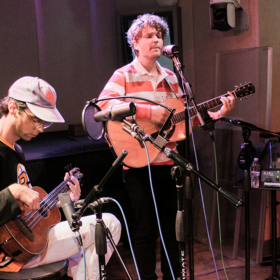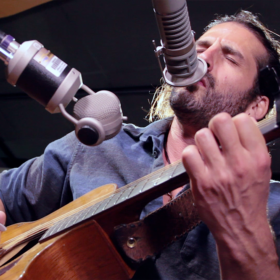
By Breanna Nesbeth, Staff Writer
I remember the first time I saw Yves Tumor live, and I especially remember a remark I heard about them after the show had let out and we concert-goers began to spill out onto the streets of Boston:
“Almost like… a Black Mick Jagger?”
There was an uncertainty to their words. I take it that it stemmed from their dissatisfaction with the comparison. Because, even utilizing a pause to search for the correct word (and in this case, person), that still didn’t feel like a sure enough answer.
I can’t blame them. The show which we had just watched was nothing like I’ve ever seen before. It was a show where a seemingly sublime rockstar stalked the stage in a pair of knee-high heeled leather boots paired with spikes, studs, and fur as accessories. Where shadowy, experimental music boomed throughout the venue, as the band elevated the intensity of their song’s studio recordings.
The performance was both exhilarating and feral. It’s tempting to say that it showed off a new wave of rock music for a new generation— seeing that the opening track from the touring album, Heaven To A Tortured Mind, is titled “Gospel For A New Century.” But in doing so, I confine Yves Tumor’s work to such a small category. And breaking boundaries is all Yves Tumor is set out to do.
The style, charisma, and musicality of Yves Tumor are thrilling. They’ve made a unique career for themself by producing a mix of electronic and experimental rock melodies, all as a Black, non-gender conforming artist. But the unique combination of noise, pomp and androgyny utilized by Yves is nothing new. In fact, it has been what makes Black rockstars, rockstars, for generations now.
CONTEMPORARY ARTISTS BREAKING THE BINARY
If we were to take a look around the music industry today, we’d notice that many other Black artists have utilized a similar form of artistic expression as Yves Tumor.
Take, for example, Steve Lacy. His musical identity can best be identified through his use of imaginative guitar and bass textures, which when brought together, produce projects like Apollo XXI, his solo debut. The sound of the project is not quite definable as the work is funky, indie, groovy and pop-y.
Like Yves, Steve Lacy’s music is an exploration of so many genres that attempting to confine it to a single one would serve it no justice. Also, similarly enough, much of Apollo XXI explores sexual anxiety and liberation as Lacy takes listeners on his journey of coming to terms with his sexuality and gender identity.
And if these two names weren’t enough, WILLOW has also undergone quite a large transformation musically and identity-wise as an artist. As the daughter of former rockstar Jada Pinkett-Smith — a member of the band Wicked Wisdom — WILLOW is a continuation of the legacy of Black rock acts. With the recent release of her fourth studio album, she has fully leaned into the rock scene, influenced by 2000s punk music.
All three of these artists are creating their own, unique image of what a rockstar is, especially as queer, Black performers. Their ability as people to reject gender and racial norms then strongly translates into their artistry. These musicians reject creating within a conventional genre and the idea of what a “rockstar” is to look like.
But, in recognition of contemporary Black, queer artists who have the opportunity to mold their expression, we have to understand who came before and paved the way for them to do so.
SO, WHO PIONEERED THE BLACK, QUEER ROCKSTAR IMAGE?
Believe it or not, the patron saint of rock is a Black woman. Sister Rosetta Tharpe is the original punk rebel from which artists like Yves Tumor, Steve Lacy, and WILLOW were all born. Hardcore punk rock was the creation of the daughter of two plantation workers in the Jim Crow South.
Her ability to utilize the electric guitar to create enthralling noise in ways people have never heard before attracted audiences all over. This is especially funny, considering she wasn’t even allowed to play at a good amount of music venues around the country. SRT’s identity sits at the intersection of queer, Black and rockstar.
She and her partner, Marie Knight, would perform together, with Knight serving as vocalist and pianist while SRT did both, plus guitar. Together, the two would go on to inspire generations of artists to come. From Chuck Berry to Elvis, rockstars to come would continue to acknowledge Tharpe’s musicality as an influence.
The legacy left by SRT is undeniable. She is, quite literally, your favorite rockstar’s favorite rockstar.
During his induction speech at the Rock-n-Roll Hall of Fame, Johnny Cash had recognized her as his favorite singer. And folks from Jerry Lee Lewis to Aretha Franklin credited her musicianship as an important influence on them.
Even Little Richard! Considered one of the “Founding Fathers of Rock,” Little Richard, much like SRT, was also a genre and gender-norm-breaking musician. With fervent shrieks and flamboyant attire, accompanied by a joyful, gender-bending persona, Little Richard influenced a generation of musicians to come.
I find it funny how my fellow concert-goer chose to identify Yves Tumor as a “Black Mick Jagger” when Black, queer, rock and roll artists like SRT and Little Richard had been performing and putting their work out into the world for ages.
Perhaps it's because the rockstar image has been whitewashed? Despite being birthed from a Black woman, things have somehow become lost in translation.
Artists like Yves Tumor, Steve Lacy, WILLOW and their influences will continue to thrive with their niche audiences, however. Black, queer musicians have and will continue for generations to sit at the intersection of their racial and sexual identity, incorporating them both into their music.
Find more of WERS' Pride month essay and article series here








![The Kooks LIVE In Studio Performing “Ooh La” [Acoustic] The Kooks LIVE In Studio Performing “Ooh La” [Acoustic]](https://wers.org/wp-content/uploads/2017/01/The-Kooks-5-1-280x280.png)




